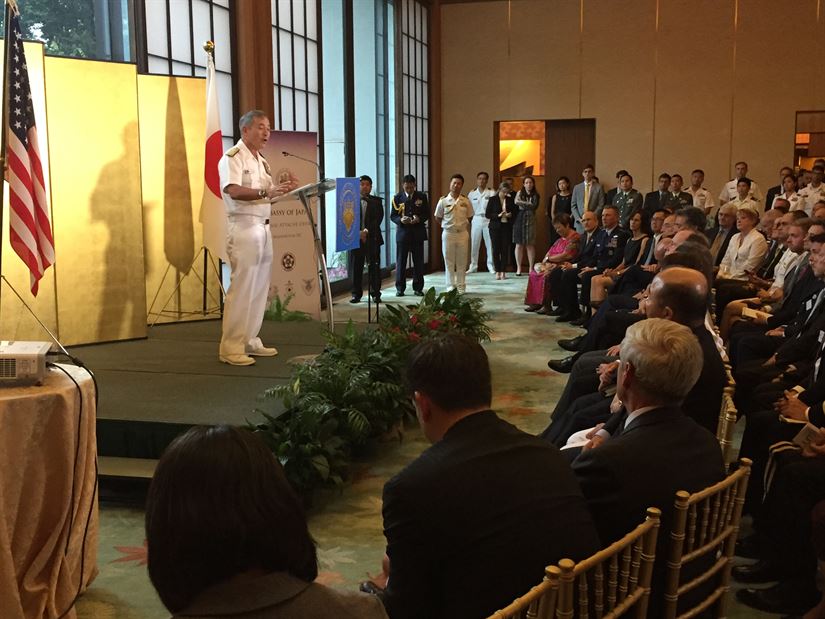Navy Adm. Harry B. Harris Jr., commander of U.S. Pacific Command, spoke at the 4th Japan-U.S. Military Statesmen Forum in Washington D.C. last week, addressing threats to the United States and its allies in the Pacific, including China, North Korea, and the Islamic State in the Philippines.
Admiral Harris explained that the nature of the threats posed in the Pacific dictate that U.S. and allied forces learn to adapt as quickly as the environment changes, which has been at an increasing rate in recent years. Those rapid changes include North Korea’s recent advances in ballistic missile technology, including two successful ICBM test launches, as well as China’s increasing aggression in the East and South China Seas. ISIS banding together with other extremist organizations to capture and occupy Marawi City in Mindanao in the Philippines also represents a new development in the region that threatens U.S. and allied interests.
“That’s a lot of change in the last 12 months,” Harris said. “But I’ll point out three truths that have not changed.”
Those three truths, according to the PACOM commander, are the importance of the Indo-Asia-Pacific region to the United States, American’s determination to remain a Pacific power and leader, and finally, the importance of a strong U.S. – Japanese alliance.
In a world crying out for leadership at the global level, the need for our alliance has never been stronger,” he said. “Today, the ties that bind our countries together have never been more robust. And I submit that those ties have never been more vital than they are today because of the mutual threats we face.”
After summarizing the situation, Harris went on to elaborate on the specifics of some of the threats posed in the region, starting with Kim Jong Un’s pursuit of nuclear weapons and the ballistic missile platforms needed to deliver them to far off targets. North Korea’s most recent test, which saw a long-range ballistic missile remain airborne for a whopping 47 minutes before splashing down some 620 miles away, has led some experts to speculate that Kim could now target U.S. cities as far away as Boston or New York.
“North Korea is a clear and present danger” to global peace and stability, Harris explained. Although Russia and China have effectively proven, at best, to be disinterested in seriously pursuing a denuclearized North Korea, Harris made sure to point out that Kim poses a threat to them as well.
“[North Korea is] a threat to the entire world because North Korea’s missiles point in every direction,” he said. “It’s the reason why we call for all nations to implement far stronger economic sanctions against Pyongyang.”
Although there is some speculation regarding the true extent of North Korea’s ICBM technology, Harris echoed statements he’s made previously by suggesting that the threat remains regardless of the specifics of their ICBM program.
“While I don’t know if those missiles can hit what they’re aimed at, but like in horseshoes and hand grenades, getting close is all that’s needed when you’re dealing with nuclear weapons,” the admiral said. He went on to explain that he expects their capabilities to continue to improve over time, making the threat Kim poses ever larger.
Harris went on to indicate that diplomacy is still the preferred strategy when dealing with North Korea, but emphasized that diplomacy must be backed by a substantial military force in the region.
Already have an account? Sign In
Two ways to continue to read this article.
Subscribe
$1.99
every 4 weeks
- Unlimited access to all articles
- Support independent journalism
- Ad-free reading experience
Subscribe Now
Recurring Monthly. Cancel Anytime.
That’s why we deploy carrier strike groups with Aegis ships and the world’s best submarines to Northeast Asia,” Harris said. “That’s why we maintain a formidable continuous bomber presence in the region. That’s why we continue our ironclad defense of Japan, to include deploying our newest and best military platforms like the F-35 [Lightning II] joint strike fighter, the P-8 Poseidon and the MV-22 Osprey.”
Harris recommended an increase in cooperation with China, while simultaneously criticizing the nation for failing to take any real action to discourage Kim’s nuclear pursuits.
Some might find it odd for me to advocate cooperation with China on one hand while criticizing Beijing on the other, but as I like to say, great powers can walk and chew gum at the same time,” Harris said. “By that, I think we can praise Chinese efforts for help on issues like counter-piracy, even as we rightly hold them accountable for not doing enough to influence their North Korean allies. I think we can and should do both.”
China’s rapid militarization of the waterways surrounding the country has brought Chinese and American interests into conflict, but that doesn’t have to lead war, Harris added;
But because we are in competition, I’ve advocated dealing with China realistically — as it is, and not as we would wish it would be. I’ve repeatedly emphasized that we can’t allow the areas where we disagree with China to impact our ability to make progress on the areas where we do agree.”
Finally, Harris addressed the presence of ISIS in the Philippines, placing U.S. support behind the nation in its efforts to purge Islamist Extremists from their country, adding that Japan has also “done its part” by providing assets like patrol vessels and surveillance craft to the effort. This type of cooperation, he said, are “partnerships with a purpose.”
Unfortunately, there are some who question the motives for the increasingly cooperative relationship between the U.S., Japan, Australia and India,” he said. “To this I say our partnerships stand on their own merits. Deepening military cooperation between these four great democracies is based on shared values and shared concerns. So I’ve spoken about the clear benefits of a ‘democracy quadrilateral’ that enhances security cooperation between India, Australia, Japan and the U.S.”
Image courtesy of the Department of Defense










COMMENTS